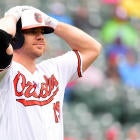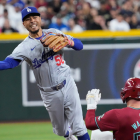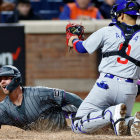When Chris Davis started 0 for 3 during the Baltimore Orioles' Monday night win against the Oakland Athletics, he didn't just add to a slow start to the 2019 season in which he's reached base just four times in 32 plate appearances.
The one-time slugger also confirmed his place in history. The bad kind.
Davis finished 0 for 5, officially taking sole possession of the longest hitless streak in league history. He has not reached base with a hit in his past 49 at-bats, dating back to Sept. 14, 2018.
In honor of Davis' improbable fall to infamy, here's a look at 10 of the most undesirable records in all of sports, with the Orioles slugger's new feat among the collection of misfortunes:
Longest MLB hitless streak
We start with our latest addition in Davis, who's now gone 49 straight at-bats without a single hit. At first glance, it doesn't seem crazy that someone -- even an All-Star -- could go that long without a base knock. Slumps happen, especially in baseball, not only because of the slog of 162 games but because of today's pitching prowess. And yet, when you really think about it, this actually is pretty bad. Set aside the fact that Davis cranked 53 homers ad hit .286 back in 2013 -- or, on the flip side, that he's a career .231 hitter -- and this record is still wild. It equals out to 14 games with an .000 average. Not ideal.
Longest NFL losing streak
Believe it or not, this one doesn't belong to the Cleveland Browns. Although the pre-Baker Mayfield days were even worse in Cleveland than you remember, with the team logging two 17-game losing streaks from 2015-17, you have to predate the Super Bowl era to recognize this bad boy. The Chicago Cardinals (who now call Arizona home) lost a whopping 29 straight games in the 1940s. After a 3-2 start in the 1942 season, the Cards finished on an 0-6 slide, then had back-to-back 0-10 seasons before "improving" to 1-9 in 1945. World War II might have played a part in the struggles, with the team even merging temporarily with the Pittsburgh Steelers at one point, but 1945's one-win campaign also marked the Cardinals' 20th straight without a playoff appearance.
Fastest boxing knockout loss
Guinness World Records says Mike Collins needed all of four seconds to drop Pat Brownson in a November 1947 Golden Gloves tournament in Minneapolis. He threw one punch, almost immediately after the bell rang, to take his fight. Russell "Ducky" Rees, a Welsh boxer, has also claimed a four-second knockout of Des Sowden in 2000. If you're going to get knocked out, you might as well get it over with quickly, right?
Longest championship drought
The Chicago Cubs made history by beating the Cleveland Indians in the 2016 World Series. The win ended their 108-year stretch without a title. That's a record so ridiculous that people in future generations just might not believe it. Think about it: In the time between Cubs championships, there were 19 different U.S. presidents, two World Wars, 14 MLB expansions and, well, just about anything else you could cram into almost 11 decades. The NFL's Arizona Cardinals (71 years) are currently enduring the longest active championship drought.
Worst career free-throw percentage
Ben Wallace is a Hall of Fame-caliber player -- a four-time All-Star, four-time Defensive Player of the Year and one-time NBA champion. But his career free-throw percentage of 41.4 is the absolute worst among all players with at least 1,200 shot attempts. He is living proof that you can be awful at foul shots and still be an awesome basketball player, but goodness gracious, you'd think even the NBA's worst free-throw shooter would still be able to hit more than 41 percent of tries from the foul line.
Biggest blowout loss
Unless you factor in Ireland's 290-run loss to New Zealand in 2008 One Day International cricket, this dubious honor belongs to Cumberland College (now University), which somehow managed to lose 222-0 in a football game against Georgia Tech in 1916. The backstory helps explain why things got out of control: Cumberland apparently discontinued its football program before the season but wasn't allowed to cancel its game vs. Georgia Tech, so the Bulldogs (more like Bullpuppies, am I right?) trotted out a bunch of fill-ins -- replacements who probably wished they had never signed up for such an epic beat-down.
Most errors in one MLB season
Former Philadelphia Phillies, Detroit Tigers and Boston Beaneaters (now the Atlanta Braves) shortstop Herman Long had a record 122 fielding blunders during the 1889 season -- a mark that was tied the following season by longtime third baseman Billy Shindle. MLB seasons still consisted of about 150 games at that point, so Long and Shindle weren't that far off from averaging an error per game. Just for reference, 2018's errors leaders in the AL and NL combined for 46 errors.
Most interceptions thrown in an NFL/AFL season
George Blanda was an incredibly durable and prestigious football player, lasting 26 years as a quarterback and kicker, earning numerous awards, including NFL Man of the Year and AFL MVP, along the way. He also threw 42 interceptions during the 1962 season, a turnover-happy record that no one's come close to matching in 30 years (crazy side note: Blanda still earned All-AFL honors that year). There were 14 regular-season games in 1962, so that means Blanda averaged three picks per game.
Worst MLB single-season record
The Cleveland Spiders' last season was 1899, and we know why: They finished 20-134. With a 1-40 stretch to close the year, this team was arguably one of the worst in all of professional sports, amassing a road record so bad it can't even be beaten with today's season scheduling -- a truly horrendous mark of 11-101. How does that even happen? You almost wonder if they just accidentally won those 11 road games while trying to stay winless away from home.
Longest MLB scoreless streak
If you thought Chris Davis' streak was bad, just wait until you get a load of these numbers from the Cubs and Philadelphia A's. The teams that failed to plate a run for 48 straight innings in 1968 and 1906. For you math wizards out there, that's like going more than five whole nine-inning games without scoring a single run. The Kansas City Royals came close to matching this in 2017, when their own scoreless streak hit 43 innings.






















